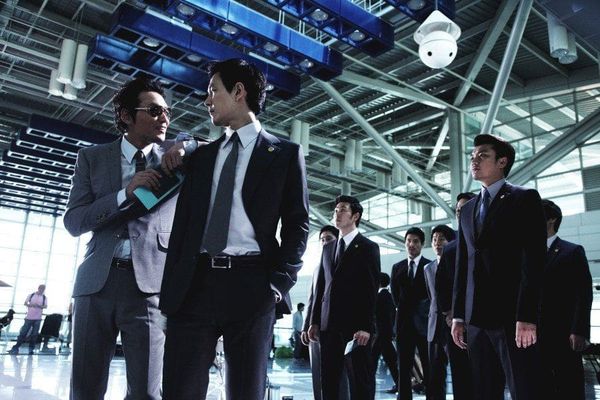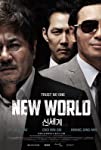Eye For Film >> Movies >> New World (2013) Film Review

Tales of undercover cops with divided loyalties are hardly a new thing, especially in Korean cinema, which is now responsible for an impressive proportion of the world's supply of gangster films. When Hoon-jung Park turns his attention to something, however, it's worth sitting up and taking notice. Achieving a delicate balance between the intersecting worlds of police, criminals and corporations, New World is a breath of fresh air.
If there's one thing that Park does impeccably, it's identifying the strengths of his actors and working out how to play to them. This film is anchored by two key performances. The first is from the redoubtable Min-sik Choi, who brings a familiar earthiness to Section Chief Kang, the man behind the mission. Calm and assured when trading insults with his enemies, subtly manipulative when persuading his agent to take things just one step further, and then a step further again, Choi extends the boundaries of a familiar persona so that viewers who have adhered to him as a reliable factor in the shifting framework of the film will come to doubt their instincts. The second is from Jung-jae Lee as undercover agent Lee Ja-Sung, who uses the poise and deliberateness he has acquired from his work as a model to create a man whose seemingly effortless cool enables him to rise quickly within the gangster hierarchy, but simultaneously lets us see the agony of being a man of conscience in a brutal profession. His delicate features, in stark contrast to Choi's, seem fragile at first but gradually harden into something more disturbing than all the violence on display.
Ja-sung's mission is initially intended to be short, but an unexpected death creates an opportunity for advancement which his handlers don't want him to miss. Having him on the inside could give them what they need to take out people at the very top. But despite the quick temper and often horrific behaviour of his gangster boss Jeong Cheong (Jung-min Hwang), who is facing off against a rival contender for the top job, Lee Jeong-gu (Park Seong-ung), Ja-sung increasing feels sympathy for him, and he's also compromised by the way Jeong makes use of his intelligence and ideas to make progress. How much is he an observer and how much is he driving forward the very criminal activity he's supposed to be bringing to an end?
As the plot twists and turns, Park draws together threads of conventional criminality and corporate activity. The chic black suits in which gangsters from all factions are clad look as natural in the boardroom as they do when accessorised with guns for skirmishes in car parks or prolonged torture sessions in warehouses. The henchmen move through shadows and brightly lit spaces like silhouettes, suggesting a deliberately cultuivated absence of personality, the best means of assuring their superiors that they are not spies and that they are unmoved by the horrific actions asked of them. Only Jeong prides himself on personality, so that Ja-sung seems caught between two men he dare not emulate.
Chung-hoon Chung and Eok Yu's lucid cinematography gives the film an eerie beauty which becomes particularly pertinent in its final scenes. Ultimately, however, it's Jung-jae Lee's portrait of a man gradually being reshaped by his environment that makes this compelling.
Reviewed on: 11 Jan 2018
















